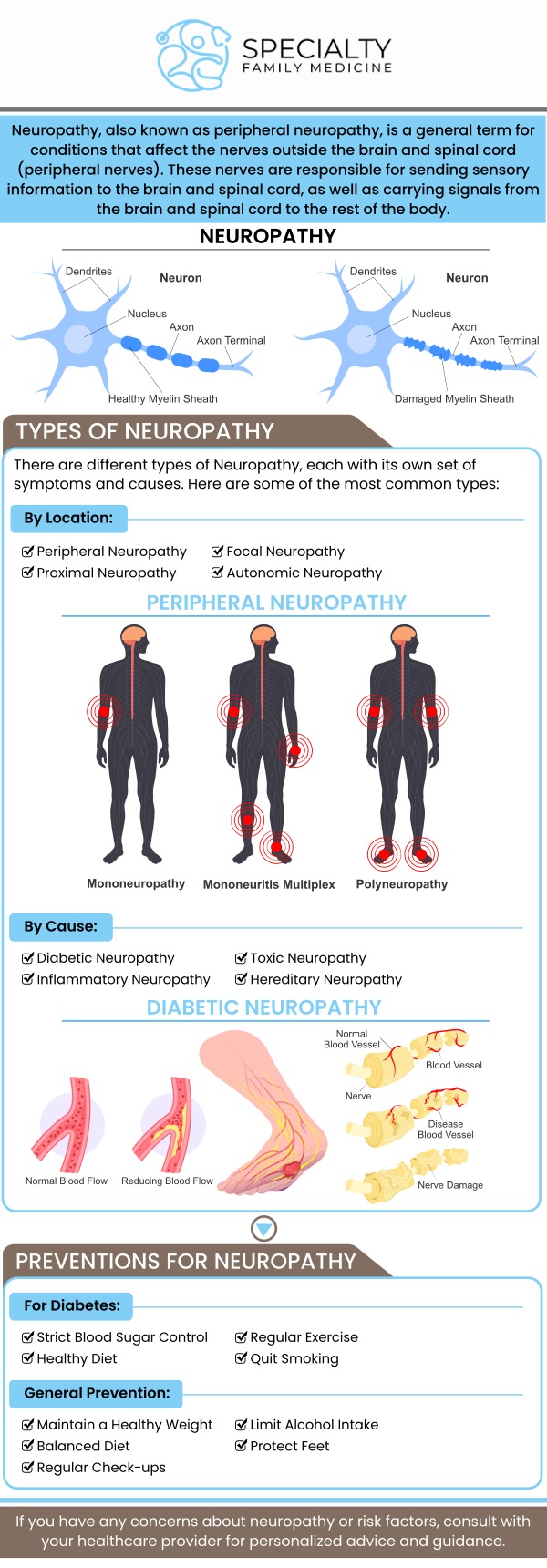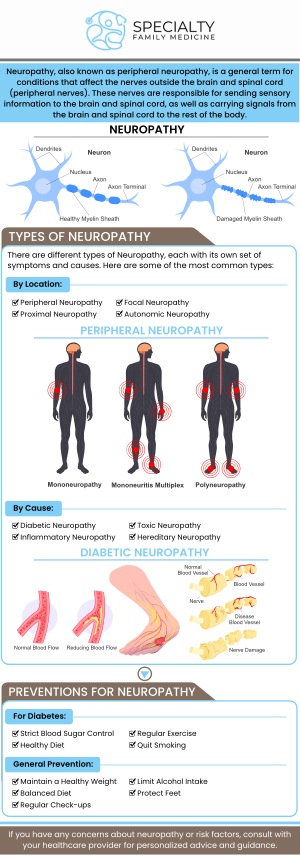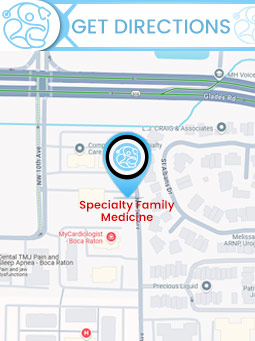Neuropathy Treatment in Boca Raton, FL
Neuropathy causes symptoms like tingling, numbness, burning sensations, and sharp pain, often in the hands and feet. It may also lead to muscle weakness and difficulty walking. In severe cases, it can affect coordination and balance. At Specialty Family Medicine, Board-certified Dr. Ayokunle Fatade offers personalized care to manage symptoms and improve your quality of life. For more information, contact us today or schedule an appointment online. We are conveniently located at 1599 NW 9th Ave, Suite 4, Boca Raton, FL 33486.


Table of Contents:
What is neuropathy?
What causes neuropathy?
What are the symptoms of neuropathy?
How can I manage my neuropathy?
What triggers neuropathy flare-ups?
Meet Dr. Ayokunle Fatade: Your Trusted Provider for Neuropathy Treatment
What makes Specialty Family Medicine the ideal choice for neuropathy treatment in Boca Raton, FL?
Neuropathy, also known as peripheral neuropathy, is a condition that results from damage to the peripheral nerves, which transmit signals between the central nervous system (brain and spinal cord) and the rest of the body. It can cause a variety of symptoms, including pain, numbness, tingling, weakness, or burning sensations, most commonly in the hands and feet.
There are several types of neuropathy, each with different causes. Diabetes is one of the most common causes, leading to diabetic neuropathy, where high blood sugar levels damage the nerves over time. Other causes include infections, autoimmune diseases, vitamin deficiencies, alcohol abuse, and certain medications like chemotherapy drugs.
Symptoms of neuropathy can vary depending on the type and location of nerve damage, but common signs include difficulty walking, muscle weakness, loss of coordination, and sensitivity to touch. In some cases, neuropathy can affect the autonomic nerves, leading to issues with blood pressure, digestion, and heart rate.
Neuropathy treatment is centered around alleviating symptoms and targeting the underlying factors contributing to nerve damage. This may include medications for pain relief, physical therapy, lifestyle changes, and in some cases, surgery to relieve pressure on the nerves. Early intervention is key to preventing further nerve damage and improving the quality of life for individuals with neuropathy.
Neuropathy, or nerve damage, can be caused by a variety of factors, including:
• Diabetes: One of the leading causes, high blood sugar over time, can damage nerves, especially in the hands and feet, leading to diabetic neuropathy.
• Autoimmune Diseases: Conditions like rheumatoid arthritis, lupus, and Guillain-Barré syndrome can cause the immune system to attack nerves, resulting in neuropathy.
• Vitamin Deficiencies: Lack of essential vitamins, especially B12 and E, can impair nerve function and cause neuropathy.
• Infections: Certain infections, such as shingles, Lyme disease, HIV, and hepatitis C, can lead to nerve damage.
• Alcohol Abuse: Chronic alcohol consumption can result in nerve damage, often referred to as alcoholic neuropathy, due to the toxic effects of alcohol on the nervous system.
• Medications: Some medications, particularly chemotherapy drugs, can cause nerve damage as a side effect, leading to chemotherapy-induced neuropathy.
• Trauma or Injury: Physical trauma from accidents, surgeries, or repetitive motions can damage nerves directly.
• Hereditary Conditions: Inherited diseases like Charcot-Marie-Tooth disease can cause peripheral neuropathy due to genetic mutations affecting nerve function.
• Toxins: Exposure to toxins, including heavy metals or certain chemicals, can damage nerves and lead to neuropathy.
• Kidney and Liver Disease: Chronic conditions affecting the kidneys or liver can cause nerve damage due to toxin buildup in the body.
Identifying the underlying cause is key to effective treatment and managing symptoms.
Neuropathy can cause a wide range of symptoms depending on the type of nerve affected. Common symptoms of neuropathy include:
• Pain: A sharp, burning, or stabbing pain in the affected area, often felt in the hands, feet, or legs.
• Numbness: Loss of sensation in the affected areas, making it difficult to feel touch, heat, or cold.
• Tingling or “Pins and Needles” Sensation: A sensation of tingling or a prickling feeling, commonly in the hands or feet.
• Weakness: Muscle weakness or a feeling of heaviness, especially in the limbs, making it harder to perform daily activities.
• Loss of Coordination: Difficulty balancing, walking, or maintaining coordination due to weakened or damaged nerves.
• Sensitivity to Touch: Increased sensitivity to touch, even the lightest touch, can cause significant discomfort.
• Muscle Atrophy: In advanced cases, nerve damage can lead to muscle shrinkage or atrophy, especially in the feet and legs.
• Digestive Problems: Nerve damage affecting the autonomic nervous system can lead to issues like nausea, bloating, and constipation.
• Loss of Reflexes: Reflexes may become diminished or absent due to nerve damage, particularly in the lower extremities.
• Autonomic Symptoms: Nerve damage can affect functions like blood pressure, sweating, and heart rate, leading to dizziness, changes in blood pressure, or abnormal sweating.
The symptoms vary depending on which nerves are damaged and can worsen over time if left untreated. Early diagnosis and treatment are essential for managing the condition.
Managing neuropathy involves a combination of medical treatments, lifestyle adjustments, and self-care practices. Here are some strategies:
• Medications: Pain relievers, anti-seizure medications, and antidepressants can help manage pain and discomfort caused by nerve damage. Your doctor may also recommend topical treatments like creams or patches.
• Physical Therapy: Regular exercises and stretches can help maintain mobility and strengthen muscles, reducing weakness and improving coordination.
• Dietary Changes: Ensuring a well-balanced diet rich in essential vitamins, particularly B12, can help support nerve health. A nutritionist may suggest supplements if you have deficiencies.
• Managing Underlying Conditions: Controlling diabetes, reducing alcohol consumption, and managing autoimmune diseases or infections can prevent further nerve damage.
• Stress Management: Practices like yoga, mindfulness, or meditation can help reduce stress, which may worsen symptoms.
Consult your healthcare provider for a personalized treatment plan to manage neuropathy effectively.
Neuropathy flare-ups can be triggered by a variety of factors that exacerbate nerve damage or increase discomfort. Common triggers include:
• High Blood Sugar: In people with diabetes, fluctuating or high blood sugar levels can worsen nerve damage, leading to more frequent or severe flare-ups.
• Injury or Trauma: Physical trauma, including accidents, falls, or surgeries, can cause nerves to become more sensitive or aggravated, triggering flare-ups.
• Stress: Emotional or physical stress can increase inflammation and make nerve pain worse, leading to flare-ups.
• Excessive Alcohol Consumption: Alcohol can worsen nerve damage over time and trigger flare-ups, particularly in individuals with alcoholic neuropathy.
• Cold Temperatures: Exposure to extreme cold or sudden temperature changes can aggravate neuropathy symptoms, particularly in the hands and feet.
• Infections: Illnesses such as the flu, colds, or infections like shingles can trigger inflammation in the nerves and lead to flare-ups.
• Lack of Sleep: Poor or insufficient sleep can heighten sensitivity to pain and make neuropathy symptoms more noticeable.
• Certain Medications: Some medications, such as chemotherapy drugs, may worsen neuropathy symptoms or cause flare-ups.
To minimize flare-ups, managing underlying conditions, avoiding triggers, maintaining a healthy lifestyle, and following your healthcare provider’s recommendations are essential.
Dr. Ayokunle Fatade is a highly skilled, board-certified family medicine physician specializing in the comprehensive treatment of neuropathy. With a deep understanding of the condition and a compassionate approach, Dr. Fatade creates personalized treatment plans tailored to each patient’s needs. His focus on effective pain management, combined with his commitment to improving his patients’ quality of life, ensures that individuals with neuropathy receive the care and support they deserve. Trust Dr. Fatade for compassionate, expert care to help manage and treat neuropathy.
At Specialty Family Medicine, we offer a patient-centered approach that focuses on personalized care tailored to each individual’s unique needs. From the initial consultation to ongoing support, we ensure that every aspect of treatment is customized to deliver optimal outcomes. Our team ensures that neuropathy treatment is effective while considering the patient’s overall health, providing a holistic approach to care. In addition to neuropathy, we also provide expert care for foot pain, neck pain, chronic pain, Achilles pain, and post-surgical pain.
Comprehensive and Personalized Care
We take the time to understand your unique symptoms, medical history, and lifestyle. This allows us to create a tailored treatment plan that targets the specific causes of your pain. Whether you’re experiencing neuropathy, foot pain, or other conditions, our patient-centered approach ensures the most effective solutions for your long-term health and well-being.
Advanced Treatment Options
At Specialty Family Medicine, we use the latest non-invasive treatments and therapies to manage neuropathy and other pain conditions. From physical therapy and pain management techniques to lifestyle modifications, we ensure our patients receive a well-rounded treatment plan designed for lasting relief. Our advanced methods are tailored to each patient’s unique needs to promote healing and improve mobility.
Ongoing Support and Education
We believe in empowering our patients with the knowledge and resources they need to manage their pain. Throughout your treatment journey, we provide continuous support, offering guidance on lifestyle changes, exercises, and self-care strategies. Our goal is to help you prevent recurrence of pain and maintain a healthier lifestyle in the long run.
Compassionate and Trusted Care
At Specialty Family Medicine, we prioritize your comfort and well-being. Our team takes the time to listen to your concerns and ensure you feel heard throughout your treatment process. With a compassionate, patient-centered approach, we are dedicated to providing relief from neuropathy, chronic pain, and other conditions, making us the ideal choice for pain management in Boca Raton.
For more information, contact us today or schedule an appointment online. We are conveniently located at 1599 NW 9th Ave, Suite 4, Boca Raton, FL 33486. We serve patients from Boca Raton FL, Highland Beach FL, Lighthouse Point FL, Kings Point FL, Delray Beach FL, Deerfield Beach FL, Boynton Beach FL, and surrounding areas.

Additional Services You May Need

Additional Services You May Need
▸ Back Pain
▸ Neck Pain
▸ Neuropathy
▸ Arthritis
▸ Sciatica
▸ Chronic Pain
▸ Motor vehicle accident
▸ Crohn’s Disease
▸ Parkinsons
▸ Post Surgical Pain
▸ Headaches
▸ Migraines
▸ Achilles Pain
▸ Foot Pain
▸ Plantar Fasciitis
▸ Elbow Pain
▸ Tennis Elbow
▸ Joint Pain
▸ Shoulder Pain
▸ Irritable Bowel Syndrome
▸ Overweight/Obesity
▸ Chest Pain Syndrome
▸ Osteoporosis
▸ Endometriosis
▸ Menstrual Pain
▸ Rheumatoid Arthritis






